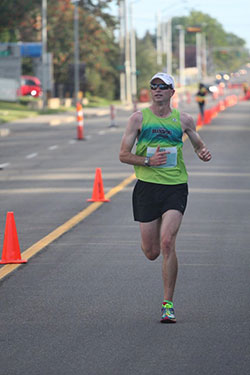Thanks to running nearly 200 kilometres (120 miles) a week, marathoner Brendan Lunty (Combined Lab and X-ray Technology ’04) has come a long way.
This August, the Alberta Health Services X-ray/lab technician won the annual Edmonton Marathon with a time of 2:35:18. It was his second win at the event (2010, 2:33:13) and a marked improvement from 2001, his first marathon. Back then, he was 60 pounds heavier than the sinewy 150 pounds he is today. He clocked 5:14:48.
“Then I started actually training. It’s paying off, I guess,” says Lunty, whose win coincided with his 38th birthday.
Of his more than 90 marathons, he’s won about 30. He assures us it’s not easy. “I was bagged by the end [of the Edmonton Marathon],” says Lunty. When his friend and 2015 winner Tom McGrath hung the medal around his neck at the finish line, “I just tried not to barf on his shoes.”
We asked Lunty what it takes – other than having an iron stomach – to make the strides necessary to finish a winner.
Be committed
Except for a break after a race, Lunty runs every day before going to work at the Viking Health Centre. “Most days I’m up at 4 a.m., out the door by 4:30 and then home by 6:30.” He gets to bed at around 10 p.m., a couple hours after putting his 5- and 3-year-old to bed. “I’m a 5- or 6-hour sleeper and that’s enough.”
If he runs during daylight hours, Lunty will push the kids in a stroller, stopping at playgrounds around his hometown of Camrose.
“Then I started actually training. It’s paying off, I guess.”
Run a lot, and strategically
Lunty trains with 3 types of runs:
- Long run – 48 km (30 miles) at a pace at which he could still talk to anyone who can keep up
- Intervals – 12 reps of a fast kilometre followed by a 400-metre jog
- Tempo run – a half-marathon (21 km, 13 miles) at race pace
He does 1 of each per week, running more leisurely half-marathons on the days between. There are no rest days. “I don’t feel myself when I rest. I feel edgy, like I’ve got to do something.”
 Carb loading
Carb loading
For the week before a race, Lunty gleefully engages in the practice of carbohydrate loading, or building up glycogen stores that the body can later convert to energy. For him, that means pasta for lunch and dinner every day. It keeps him from having to use gels or other supplements while running, which can give him cramps.
Race-day preparations
Lunty picks an ideal finish time and works backward, matching kilometre markers with time points he tracks with a stopwatch (no fancy GPS-enabled training devices for him). His preparations stop there. While he once worried about being off his feet the day before a race, and carefully watched his food and water intake, he sweat it anymore. If you’ve trained enough, “The rest of that stuff doesn’t matter. It’s all in your head.”
Find your motivation
“It used to be just times and placing and that was the motivator,” says Lunty. Today, he runs for 2 main reasons. One is its therapeutic effect – the way the sport forces the mind to disconnect from the challenges of daily life to focus solely on the body.
The other is about being a dad. “Having kids makes a big difference. It’s cool now that my kids [see me and] want to be out and active.” It keeps him pushing during a race, as well. “I don’t want to let them down.”
Be proud of yourself
Getting older doesn’t concern Lunty. He feels better than he did a decade ago and can train harder, too, he says. Today, he’s besting runners half his age. “It’s cool to know that if you work hard and put in the effort you can still kick their ass,” he says with a laugh.
Know the competition
Lunty will review the list of runners before race day but, in the end, he knows that only one of them matters. “It’s about competing against yourself,” he says. “It’s just neat when you win anyway.”